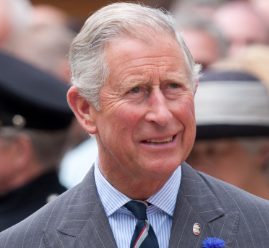Britain's Prince Charles to open new AstraZeneca research centre
Britain's Prince Charles will formally open a new 1 billion pound ($1.3 billion) AstraZeneca research and development (R&D) facility on Tuesday, as the company aims to fuel the growth of its drug pipeline. AstraZeneca has supplied two billion doses of its COVID-19 vaccine, developed at Oxford University, and is also looking to bring a preventative antibody cocktail against COVID-19 to market.

Britain's Prince Charles will formally open a new 1 billion pound ($1.3 billion) AstraZeneca research and development (R&D) facility on Tuesday, as the company aims to fuel the growth of its drug pipeline.
AstraZeneca has supplied two billion doses of its COVID-19 vaccine, developed at Oxford University, and is also looking to bring a preventative antibody cocktail against COVID-19 to market. But while the company is setting up a separate division for vaccine and antibody therapies in light of the coronavirus pandemic, it has also beefed up other areas of research
Earlier this year, AstraZeneca completed the $39 billion purchase of rare-disease specialist Alexion. "Our new Discovery Centre in Cambridge... will allow us to break new boundaries in the understanding of disease biology, bring life-changing medicines to patients and power the next stage of our company's growth," Chief Executive Pascal Soriot said in a statement.
Prince Charles, son of Queen Elizabeth and heir to the throne, will take a walking tour of the centre and give a short address at the opening. The plans for AstraZeneca's new headquarters and large R&D campus in Cambridge were unveiled in 2013, but its costs and timeframe have exceeded the initial estimate of 330 million pounds and an aimed completion date of 2016.
AstraZeneca, which has a large portfolio of treatments for diseases such as cancer, heart disease and diabetes, said the centre would support research into specialised medicines and next-generation therapeutics, including gene-editing and cell therapies. "We will have advances that could come to the clinic in the next three, four years, that can lead to really effective new drugs in various aspects of treating cancer," Dr Susan Galbraith, AstraZeneca's Executive Vice President, Oncology Research & Development, told Reuters in an interview.
"I'm very optimistic about the fact that we can make a big difference to this disease in the coming decade"
(This story has not been edited by Devdiscourse staff and is auto-generated from a syndicated feed.)
ALSO READ
Azarenka, Kalinina move into 3rd round at rain-delayed Charleston Open
Miami Open champion Danielle Collins wins twice to reach Charleston quarterfinals
Tennis-Collins reaches Charleston final with 12th successive tour win
Danielle Collins wins 12th straight match, will face Daria Kasatkina in Charleston Open final
Tennis-Collins through to Charleston semi-finals as winning run continues










